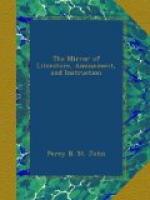In a little work just published, on “Cambrian Superstitions,” by Mr. Howells, several are mentioned so exactly similar to those prevalent in Ireland, Scotland, and England, as to leave no doubt of their common origin. The Welsh coast has also its spectre-ships, like America and the seas of the Cape, ere shipwreck.
The Mirror’s able correspondent VYVYAN has, in vol. xii. p. 408, noticed the connexion between the German Peter Klaus and Emperor Barbarossa, with the oriental Seven Sleepers and the American Rip Von Winkle. We may add, that there is a similar Welsh superstition respecting the enchanted slumber of King Arthur, and his expected reappearance upon earth before the last day, to take part in the holy wars of the times. The Poles and Turks, if we mistake not, have among them a corresponding legend; and whilst Sir W. Scott has given us that of the purchase of horses by Thomas the Rhymour, and the magic slumbers of the gigantic men-at-arms appointed to ride them, in the subterranean mews, H. has rescued very happily from oblivion a coincident English superstition. The legendary lore of mountainous and mining countries, is, with little variation, the same; and whether America, Germany, Sweden, Scotland, Wales, or our own peculiar mining districts in England be the locale of such, still may be discovered, under different names indeed, and circumstances, the demons of the mines, the guardians of hidden treasures, the freakish dwarfs and fays, who delight in unexpectedly enriching the poor and virtuous, whilst they delude most miserably all idle and worthless treasure-seekers, &c. Nay, what, we may inquire, are the oriental genii of kings, and lamps, &c., but modifications of one and the same superstition? And what are the said Ginns—who erect splendid palaces in the course of a few brief hours, and transport them at pleasure from place to place—but the Evil Ones of more modern times and northern countries, who build, according to popular tradition, bridges, and mills, &c.?—who cleave mountains, excavate ditches, and fly away with monasteries and hermitages, in an incredibly short space of time?
However, we have finished; for less than a folio could not do that justice to our subject in its various bearings which it requires;—nor, indeed, would less than an intimate acquaintance with all the tongues and traditions of all nations that are, or ever have been, upon the face of the earth—so intermingled are divine revelations, corrupt mythologies, wild and palpable fictions, fantastic imaginings, exaggerated allegories, poetical machinery, and the very insanity of human hopes, fears, and wishes, &c. &c., in the great and never to be analyzed body of popular superstition!
Can any of the readers of the Mirror throw additional light on the subject of coincident traditions?—Can any of its contributors show the connexion which subsists between oriental mythology, allegory, and legendary lore, with that of the Scandinavian nations? This Sir Walter Scott has omitted to do;—but this might afford, even formed of the materials to be gleaned from various desultory sources, another volume upon “Demonology and Witchcraft.”




